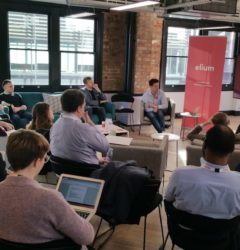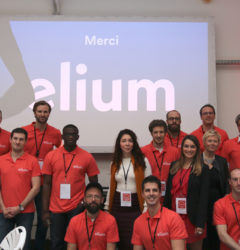17 Dec

With Lee Bryant
We met Lee at a Social Business conference in London on the 25th of November, at the British Academy. This video is part of a long list of interviews we are producing all over Europe while attending conferences.Transcript from the interview at Enterprise 2.0, London Lee: So there are 2 aspects ; one is the collaboration and one is the personal experience of knowledge, personal knowledge management and the use of it in your own productivity.It is like a pendulum swinging. We’ve gone from the organisational to the personal but now, we need to pay attention back to the longer-term organisational as well. It doesn’t surprise me to see that result.The first problem with Knowledge Management is that the field was captured by software companies. Knowledge management conferences at one time were very interesting.-You mean 10 years ago?Yes, exactly.It became 90% an exhibition of very structured software, and 10% discussion and content.In a sense, the field was captured. There is a need for good softwares and technologies. Many assumptions of the old wave of KM were just wrong. They though about this from the organisational point of view, not from a personal point of view. We need to do both.They had the wrong approach to tacit knowledge, unstructured knowledge which was an attempt to turn tacit or unstructured into structured, which is completely wrong. You just need to have access to it. It has to be in the network, and available to you.The other thing they have never really solved, that is the challenge of social software is the idea that all evidence suggests that people will not share knowledge if it is an extra step in their work. You need to be sharing in the flow of your work. Otherwise you would never bother doing it because you bear the costs but you don’t get the benefits from that sharing. I think we are still not there yet in terms of tools and behaviours but I think we are closer to a position where you can just work and then the sharing happens, magically in the background.For me, the first tools that really did well work were probably wikis because you got personal benefits from organising your own content, but if everybody organises their own content, then you have this amazing collective resource that can help the organisation. I think some of the flow tools like activity streams and so on have been helpful in that sense as well. We are still stuck in a world of documents. If you look at the leading social platforms like Jive or IBM connections, they still assume that people make Word files. Why would anybody make a Word file? It’s sort of crazy, it has no value. Beyond the words inside it, which is sort of trapped and not able to share themselves with other knowledge.I think it is a long journey. We have not finished that journey. We are not in document free world, in a completely unstructured knowledge world. But yes it is changing. It is gonna be interesting actually to see the return of the focus on knowledge capture and knowledge organisation. Working with knowledge and being conscious of knowledge will become more of an issue in social platforms.Mobile, do you think it will accelerate or reduce the nutrition of structured content ?I think mobile will reduce the emphasis on documents. It is just a pain to use one of these absurd document formats on a mobile device. However, we are happy using our Google docs on a mobile device. Google docs technically are documents but they have all the goods sides and not so many of the bad sides.What is the future of composite documents?I think the future is just words. Those words are independent of structure and of file format. If you look at some companies who still communicate with each other in Powerpoint files. It is the craziest thing you could do. It takes so long to make a Powerpoint file. They are very hard to search, and then you end using some awful system like SharePoint to store them in. It is just not what normal people would do at this point in time. The future is just about words and also about agile organisation of content.It is not about having one taxonomy or one structure into which you put everything. It is about each of us having a window onto that structure and taxonomies which are a flexible context specific. There are absolute needs for taxonomies, there are very clear taxonomies in medicine, engineering, legal,… There are many other use cases for documents. We hoped that tagging would allow multiple organisational layers to be placed on the same content. That happened for a while.It was hard work and people left that behind a bit. There is room for smarter ways to flexibly organise knowledge.
During the summit, Raphaël and Gregory organised a workshop entitled “Striking the balance between social conversations and structured knowledge”. Unsurprisingly, the outcome of the round table was that the majority of the 30 participants have been focusing on personal and unstructured initiatives. We believe however, as Lee and others, that KM will be making a strong comeback in the years to come. Yet in a different form.Have you already deployed collaborative tools such as Google Apps, Jive, Yammer? Are you now thinking of curating and reorganising the most relevant and essential knowledge produced or is their search engine sufficient? Are you thinking of ways to make your traditional information/document management systems (Notes/Domino, structured document databases, etc) evolve towards new paradigms? Now is probably a good time to get familiar with the emergence of Social Knowledge Management.






